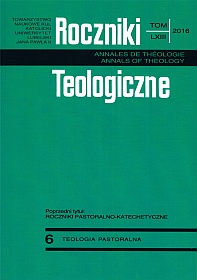Woundedness. New Paradigma for Central and Eastern Europe
Abstract
Since the first quarter after the fall of communism in Central and Eastern Europe religions and bigger and smaller religious communities are one of the most important public players. In every post-communist states there are new laws regarding freedom of religion and church financing. Local religious communities are important players in the rebuilding of civil society. Over the national/nationalistic dimension of the new public presence of religion there are some regional issues of history, identity and live in freedom, which should be analyzed. Contemporary Central and Eastern Europe can be characterized as one multiple cultural region in seeking social and cultural identity. One of the most important dimension of the regional context is the post-genocide experience, the permanent imagination of genocides and other forms of historical wounds. Under genocides I mean the experience of so called bloodlands (Snyder), Holocaust and Srebrenica. In my presentation I try to argue for one particular interpretation of the societies in Central and Eastern Europe dealing with post-genocide public discourses. Religions, theologies and churches play important role in seeking and offering post-genocide identity – that kind of public activity is in my opinion the central and special point in the adequate and appropriate interpretation of contemporary processes in the region; and that approach can be seen as one particular and original theoretical framework for understanding the region today and not at least for one new vision of pastoral care as well.
References
Bahr E., „Meine Metaphern sind meine Wunden“. Nelly Sachs und die Grenzen der poetischen Metapher, w: M. Kessler, J. Wertheimer (Hrsg.), Nelly Sachs, Neue Interpretationen: mit Briefen und Erläuterungen der Autorin zu ihren Gedichten im Anhang, (Stauffenburg Colloquium, Bd. 30), Tübingen: Stauffenburg 1994, s. 3-18.
Beattie A.H., Post-Communist Truth Commissions: Between Transitional Justice and the Politics of History, w: L. Stan, N. Nedelsky (red.), Post-Communist Transitional Justice: Lessons from Twenty-Five Years of Experience, New York: Cambridge University Press 2015, s. 213-232.
Bell C.M. von, Ritual theory, ritual practice, New York [u.a.]: Oxford University Press 1992.
Bell C.M. von, Ritual: Perspectives and dimensions, New York [u.a.]: Oxford University Press 1997.
Bibó I., Die Misere der osteuropäischen Kleinstaaterei, Frankfurt am Main: Neue Kritik 1992.
Bottoni S., Gábor A., A várva várt Nyugat: Kelet-Európa története 1944-től napjainkig. Magyar történelmi emlékek, Budapest: MTA BTK Törttud. Int. 2014.
Bremer Th., Religion und Nation: Die Situation der Kirchen in der Ukraine, (Schriften zur Geistesgeschichte des östlichen Europa, Bd. 27), Wiesbaden: Harrassowitz 2003.
David R., Transitional Justice and Changing Memories of the Past in Central Europe, „Go-
vernment and Opposition” 50(2015), nr 1, s. 24-44.
Etzelmüller G., Christentum als Religion der Heilung: Zur Verhältnisbestimmung von moderner Theologie und Krankenbehandlung, w: G. Thomas, I. Karle (Hrsg.), Krankheitsdeutung in der postsäkularen Gesellschaft: theologische Ansätze im interdisziplinären Gespräch, Sttutgart: Kohlhammer 2009, s. 448-464.
Girard R., Ich sah den Satan vom Himmel fallen wie einen Blitz: Eine kritische Apologie des Christentums, München, Wien: Hanser 2002.
Graf F.W., Kirchendämmerung: wie die Kirchen unser Vertrauen verspielen, München: Beck 2011.
Kraß A., Die Mitleidfähigkeit des Helden. Zum Motiv der compassio im höfischen Roman des 12. Jahrhunderts (‚Eneit' – ‚Erec' – ‚Iwein'), w: W. Haubrichs, E.C. Lutz, G. Vollmann-Profe (Hrsg.), Wolfram-Studien XVI: Aspekte des 12. Jahrhunderts Freisinger Kolloquium 1998, Berlin: Erich Schmidt Verlag GmbH & Co KG 2000, s. 282-304.
Markschies C., Der Schmerz und das Christentum, „Schmerz”, 21(2007), nr 4, s. 347-352; DOI:10.1007/s00482-007-0565-0.
Máté-Tóth A., Theologie in Ost(Mittel)Europa, Ostfildern: Schwabenverlag 2002.
Máté-Tóth A., Gärende Gesellschaft, w: G. Buß, M. Luber (Hrsg.), Neue Räume öffnen, Regensburg: Friedrich Pustet Verlag 2013, s. 164-184.
Metz J.B., Memoria passionis: Ein provozierendes Gedächtnis in pluralistischer Gesellschaft, Freiburg im Breisgau–Basel–Wien: Herder 2006.
Mitu S., Die ethnische Identität der Siebenbürger Rumänen: eine Entstehungsgeschichte, Köln–Weimar: Böhlau Verlag 2003.
Muessig C., Signs of Salvation: The Evolution of Stigmatic Spirituality Before Francis of Assisi, „Church History” 82(2013), nr 1, s. 40-68.
Oláh Z., Anmerkungen zur Sptuaginta von Jes 7, 14, „Sacra Scripta” 11(2013), nr 1, s. 9-25.
Peng-Keller S., Christliche Passionsmeditation als Schule der „Compassion“, w: I.U. Dalferth, A. Hunziker (Hrsg.), Mitleid: Konkretionen eines strittigen Konzepts, Mohr: Siebeck 2007, s. 307-342.
Schnackenburg R. (Hrsg.), Herders theologischer Kommentar zum Neuen Testament, 2. erg. Aufl. Freiburg im Breisgau: Herder 1977.
Copyright (c) 2016 Roczniki Teologiczne

This work is licensed under a Creative Commons Attribution-NonCommercial-NoDerivatives 4.0 International License.





